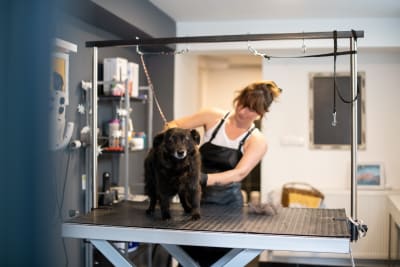Residents of New Jersey who find it easy to develop compassion and bond with animals and are open to constant learning and improvement would do well to consider a career as a veterinary technician.
Thanks to this profession, they can actively contribute to life-saving and life-prolonging care for several kinds of pets and animals daily. For those who would like to consider the field, the article below contains everything you’ll need to know, including the educational, licensure, and certification requirements.
We also provide a quick overview of the possible salary figures for an aspiring vet tech in New Jersey and the factors that can influence these numbers.
How to Become a Veterinary Technician in New Jersey
Below are the steps involved in becoming a veterinary technician in New Jersey.
Step 1: Graduate from a veterinary technology training program
Graduating from an accredited veterinary technology training program is necessary for all aspiring vet technicians in New Jersey. The body accrediting these programs is the American Veterinary Medical Association Committee on Veterinary Technician Education and Activities.
Step 2: Pass the veterinary technician national exam
Most states expect all veterinary technicians to pass the VTNE once they graduate from a training program. Even though doing so is not mandatory in Michigan, it can still be highly advisable, especially for those who would like to obtain a valid license in other states.
Step 3: Apply for certification
Even though it is not required by law, veterinary technicians in New Jersey may choose to apply for professional certification following the steps below.
Consider exploring careers with similar paths:
Top Veterinary Technician Schools in New Jersey
Individuals interested in applying for an AVMA-accredited veterinary technician program in New Jersey have two options. To complement these, individuals may consider online programs beyond the state. We take a look at some of these options below.
Bergen Community College
Paramus, NJ Online + Campus
Based in Paramus, Bergen Community College offers a top-class associate of applied science degree in veterinary technology to teach students the fundamentals of veterinary clinical experiences. CVTEA accredits the program and provides a straightforward part to completing the national examination for veterinary technicians.
Tuition
$219 - $402 per CreditContact
(201) 447-7200
admissions@bergen.edu
Camden County College
Blackwood, NJ Online + Campus
Camden County College in Blackwood is the second destination where residents of New Jersey can acquire training to become veterinary technicians in an institution accredited by the AVMA-CVTEA.
Tuition
$130 - $199 per CreditContact
(856) 338-1817
admissions@camdencc.edu
Penn Foster College
Online, NJ Online Only
As mentioned earlier, the two entries above are the only programs for veterinary technicians in New Jersey that the American Veterinary Medical Association Committee on Veterinary Technician Education and Activities accredits. However, individuals may consider online programs such as Penn Foster College, which offer comprehensive coursework and flexibility.
Tuition
$1,599 - $1,999 per SemesterContact
(800) 471-3232
infoims@pennfoster.com
State Licensure and Certification Requirements
The state body that certifies New Jersey veterinary technicians is the NJVTA- New Jersey Veterinary Technicians & Assistants, Inc. It is worth mentioning that certification for veterinary technicians in New Jersey is not mandated by law.
Still, certification can offer several benefits, including more accessible employment and better career growth opportunities. Additionally, credentialed veterinary technicians may also earn more than non-credentialed ones.
Those pursuing the NJVTA credential must renew their certification every two years through 20 hours of continuing education.
Learn about veterinary technician licensing and certification in neighboring states:
Salary and Career Outlook
The annual salary for veterinary technicians in New Jersey is $37,853 – the same as the national average. Vet technicians in the state who earn the highest average yearly salary take home around $51125 per year, while those who make the least tend to take home an average salary of $28,027 annually.
Sorting strictly by experience, veterinary technicians in New Jersey with less than one year of experience earn an annual average salary of $35,380. In contrast, those with more than 10 years of experience earn around $47,167 per year on average.
Whippany is the highest-paying city for vet techs in New Jersey, with an annual salary of $45,235. Morristown follows this with $44,176; Princeton with $42,756; Oakhurst with $38,160; and Cherry Hill with an average yearly salary of $37,959.





